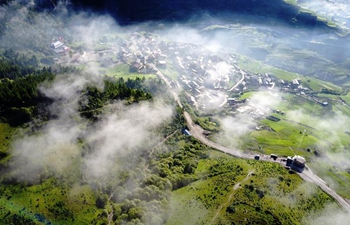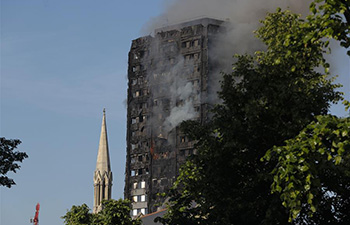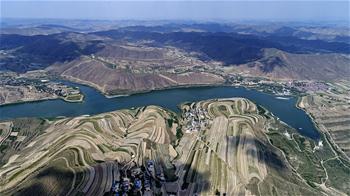BRUSSELS, June 21 (Xinhua) -- Europe is facing daunting challenge of combating terrorism, not only because of the frequency of terror attacks but also the way they are being staged.
THREAT HIGH IN CONTINENT
Terror attacks continue to grab headlines of European media these days with the latest in Brussels, de facto capital of the European Union (EU).
A small explosion caused by a man with a bag of explosives that occurred Tuesday evening in the Central Station of Brussels, was considered a terrorist attack.
Though causing no other casualties except the attacker himself was shot dead, the latest attack added another onto the terrorism-plagued continent.
Britain has been hit by no less than four separate attacks in the last few weeks, with the latest described as "sickening" by British Prime Minister Theresa May when a van was deliberately driven into worshippers leaving a mosque in north London.
This was followed by another attack in Paris where a man was killed on Monday after ramming his car carrying explosives into a police van in the Champs Elysees avenue.
French Interior Minister Gerard Collomb said the attacks showed that "the threat is high in all the countries of our continent."
Europe has found itself at the frontline in the fight against terrorism. The sight of armed soldiers on the streets of European cities has become all too familiar.
Though many don't want to accept it, but it's true that security pressures facing many of the European countries are increasing.
ATTACKERS MORE ELUSIVE
Compared with the attacks in the past, terror attacks in Europe this year are showing signs of new change, which make prevention and tracing more difficult than before.
The suspect of Tuesday's Brussels central station attack has been identified as a 36-year-old Moroccan citizen, who lived the city's troubled district of Molenbeek, but was not known as a potential terrorist by police authorities, the Belgian federal prosecutor's office said Wednesday.
For the attacks staged by people not in police watchlist, prevention in advance is almost a mission impossible.
British PM May also admitted Britain was "experiencing a new trend in the threat the country faces."
She said "as terrorism breeds terrorism and perpetrators are inspired to attack, not only on the basis of carefully constructed plots after years of planning and training, and not even as lone attackers radicalized online, but by copying one another and often using the crudest of means of attack."
New figures from Europol, the EU police agency, indicated that the number of people arrested related to jihadist terrorism in Europe rose for the third consecutive year in 2016 to 718 and is expected to keep rising.
Europol said that more than half of all the completed or attempted terrorist attacks in Europe in 2016 occurred in the UK, followed by France.
One thing that deserves attention is the growing trend of domestic terrorism, or homegrown terrorism, in Europe.
"Jihadist actors can be both directed by IS or merely inspired by IS ideology and rhetoric," noted Europol's latest terrorist trend report.
"SOFT TARGETS" PICKED
Jihadist terrorists have been found to use a range of weapons to include bladed weapons, automatic rifles, explosives and vehicles, as has been witnessed in London in recent weeks.
John Duhig, a senior counsellor at the European Foundation for Democracy, warned that attacks on "soft targets," like those seen in Britain, were more difficult to prevent, requiring less preparation and communication than more complex operations, and therefore more difficult for the authorities to detect.
Brussels has been on high alert after suicide attacks hit the city's airport and metro systems on March 22, 2016, which left 32 people dead and many more injured.
Similarly, vulnerable public have repeatedly fell to victims of terror attacks in both Britain and France.
IS CLOUT TANGIBLE
Investigation found that the Islamic State (IS) was behind the most recent terrorist atrocities while it did claim responsibilities for some.
In the wake of attacks in Brussels in 2016, EU counter-terrorism coordinator Gilles de Kerchove has warned of further terror plots linked to IS after it lost key territory in Syria and Iraq.
Kerchove said the West faced a threat both from homegrown terrorists, who were radicalized via the internet, and "foreign fighters" who leave Europe to fight in Syria and Iraq.
According to Europol's report, Europe is experiencing a new trend in terrorism where perpetrators of terrorist attacks in the EU include both foreigners, of whom a number may have resided in the EU for a long time, and nationals who have grown up in the countries they attacked.
"The threat of lone wolf attacks initiated by those who have never left Europe and have been radicalized online remains a significant threat," Duhig cautioned.
WAR OF IDEOLOGY?
Theresa May described what happened as the result of an "ideology that is a perversion of Islam and a perversion of the truth."
Analysts from the European Policy Centre said that terrorist groups will continue to exploit the socio-economic grievances of Muslim immigrants to the EU, in order to recruit and incite them to engage in terrorist activities.
Asked about how to eradicate extremism, Belgian Interior Minister Jan Jambon said: "We have to sell our own values. We leave the door open to IS with their proposals. We have to be more convinced in presenting our own values and chances to youngsters who are maybe open to IS ideology."
In overall terms the level of activity in the EU attributed to jihadist terrorism remains high, Europol said in its report.

















